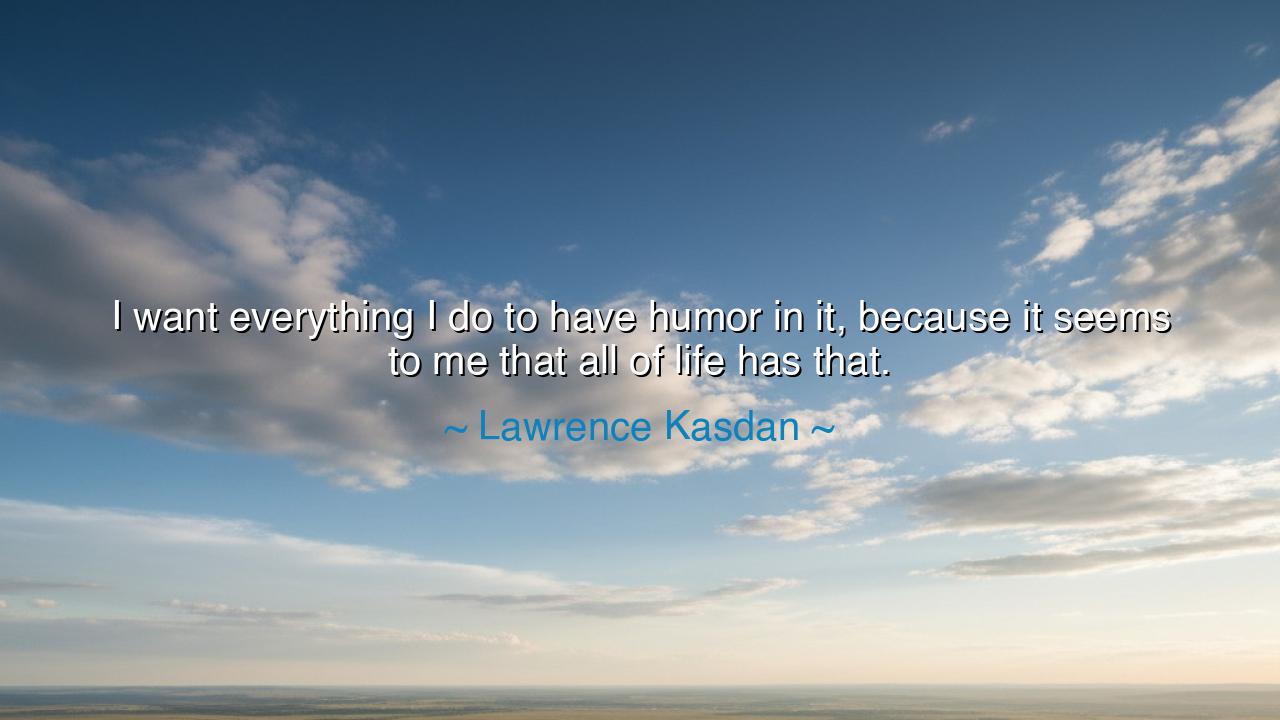
I want everything I do to have humor in it, because it seems to
I want everything I do to have humor in it, because it seems to me that all of life has that.






In the words of Lawrence Kasdan, the storyteller whose films bridged the ordinary and the eternal, we find a truth that gleams softly yet profoundly: “I want everything I do to have humor in it, because it seems to me that all of life has that.” Though simple in phrasing, this declaration holds within it a vision of the world — one that recognizes humor not as mere amusement, but as one of the divine elements of existence. It is the thread that binds sorrow and joy, tragedy and triumph, shadow and light. For in the eyes of the wise, humor is not the denial of pain, but the light that dances upon its surface — transforming suffering into understanding, and endurance into grace.
Lawrence Kasdan, the creator behind stories like The Big Chill and The Empire Strikes Back, speaks not only as a filmmaker, but as a philosopher of the human heart. His words are born from the understanding that humor is woven into the fabric of all that lives. To see life truly — to see it whole — is to perceive both its gravity and its absurdity. For every birth carries the shadow of death, every triumph a hint of folly, every sorrow a glimmer of laughter waiting to be discovered. Humor, then, is the voice of acceptance. It is the soul’s way of saying, “Yes, life is difficult — and yet, I choose to smile.”
The ancients knew this dual nature of life. In the plays of Aristophanes, laughter was a form of wisdom, teaching the Athenians to see themselves more clearly. His comedies mocked the powerful, yet they also comforted the weary. To laugh, he understood, was to reclaim one’s humanity amidst the turmoil of politics and war. Likewise, the philosopher Seneca wrote that the wise man does not scorn the world, but smiles at it — for the one who can laugh at fate is no longer its slave. Kasdan’s humor, like theirs, springs from the same deep understanding: that to live well is not to avoid pain, but to find harmony between laughter and lamentation.
There is a story told of Charlie Chaplin, the great silent comedian, who once said, “Life is a tragedy when seen in close-up, but a comedy in long-shot.” He too knew what Kasdan meant. Chaplin lived through poverty, exile, and public scorn — yet he gave the world laughter that transcended despair. Through the missteps of the Tramp, he revealed the nobility of failure and the courage of persistence. His art, like Kasdan’s, was infused with humor, not because life was light, but because life was heavy — and humor was the way to carry it.
When Kasdan says that all of life has humor, he does not mean that life is always funny. He means that it is always ironic, always layered, always full of contrast — a cosmic dance between joy and sorrow, between the divine and the ridiculous. The child’s laughter and the sage’s wisdom come from the same source: the recognition that existence is far too vast to be taken entirely seriously. The stars burn, the oceans rise, empires fall — and yet a single moment of laughter can remind us of our smallness and our strength at once. Humor becomes not mockery, but awe — the laughter of the mortal before the mystery of being.
Yet there is also tenderness in Kasdan’s belief. For humor, rightly understood, is an act of compassion. It is how we forgive ourselves and others for being human. In the heat of conflict, a shared laugh can dissolve anger; in the depths of sorrow, a wry smile can remind us that we still live. This kind of humor does not belittle, but heals. It builds bridges where words fail, and brings light where reason falters. Those who can laugh kindly — even at their own failings — possess a quiet wisdom greater than any philosopher’s.
Let this then be the lesson: fill your life with humor, not as decoration, but as sustenance. Let your work, your art, and your words carry the warmth of laughter. When the world grows heavy, seek the irony hidden within it; when others stumble, lend them not scorn but a smile. To laugh is not to flee from truth, but to embrace it — to stand before the vastness of existence and say, “I see you, and still, I choose joy.” For humor is not the opposite of seriousness; it is its completion, the melody that gives rhythm to the song of life.
In the end, Lawrence Kasdan reminds us that humor is the most human of virtues — the spark that reveals divinity in our flaws. So, live as he teaches: let your laughter accompany your labor, your compassion temper your wit, and your joy stand side by side with your sorrow. For to see the humor in all things is to see life as it truly is — tragic, beautiful, and endlessly alive.






AAdministratorAdministrator
Welcome, honored guests. Please leave a comment, we will respond soon